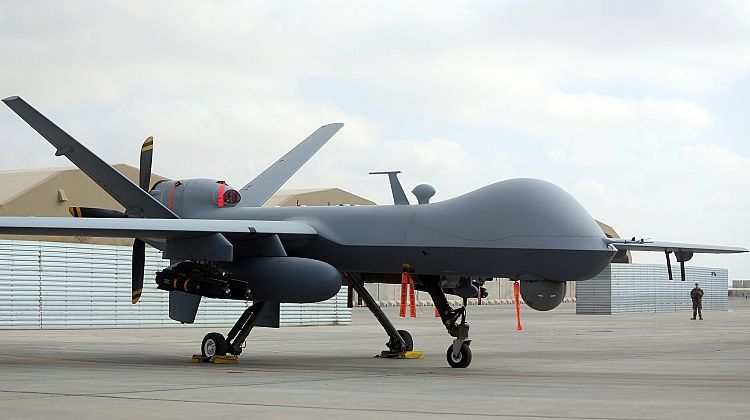
What are the rules for flying across the Black Sea?
Moscow has denied it. Washington dubbed it an "unprofessional" interception. And it has sparked a ratcheting up of confrontational rhetoric between Russia and the US.
But why was the encounter "unprofessional” and what are the rules for flying over the region? Euronews asked the experts.
Flying drones over international waters
The Black Sea – which borders Ukraine, Russia, Turkey, Georgia, Romania and Bulgaria – is a major theatre in the war in Ukraine.
Since Russia’s full-scale invasion, Moscow has used its navy fleet in the Sea to fire missiles at Ukrainian cities and to target the country's energy infrastructure.
And Ukrainian forces have also targeted Russian infrastructure and its navy in the region – famously sinking Moscow’s flagship vessel, the Moskva, in April 2022.

But, countries are still allowed to fly drones and other aircraft over parts of the Black Sea, although not all of it.
Benjamyn Scott, an Assistant Professor at the Institute of Air and Space Law at Leiden University, told Euronews that the Black Sea is divided into sections: the territorial waters that belong to its bordering countries and its international waters.
According to Article 87 of the UN Convention on the Law of the Seas, international waters, and their airspace, are open to all countries.
While Turkey closed the Bosphorus Strait – a strip of water connecting the Black Sea to the Aegean Sea - to non-regional warships in 2022, the Black Sea remained, effectively, open, meaning the US could still access the area’s international airspace through its allies.
“To enter these international waters, [nations] can also go through the territory of a state,” Scott said.
“It would need to get prior permission [from the countries], whether on an ad-hoc basis or through pre-existing arrangements in order to enter this international airspace around the Black Sea.”

Drones are a ‘common presence’
Since Russia launched its full-scale invasion of Ukraine, drones have “become a common presence in international airspace over the Black Sea,” according to James Patton Rogers, an Associate Professor at the Department of Political Science at the Danish Institute for Advanced Study.
“With the worry that Russia is a resurgent offensive power, there has been a broader increase in US and NATO drone border patrols across both the Baltic and Black Sea regions to keep a watchful eye on Russian movements.”
Encounters are not unusual between Russia and NATO aircraft. Prior to 2022, NATO and Russian planes were reportedly involved in an average of 400 interceptions every year, according to AP.

But what makes Tuesday's interception unique is the accusation from the US that it was “intentional” and "aggressive."
“We know that the intercept was intentional. We know that the aggressive behaviour was intentional,” US General Mark Milley said after the drone crashed on 14 March.
And according to Scott, there are standard ways to intercept foreign aircraft, such as "not flying in a dangerous manner."
Rogers also pointed to the cost of the drone as a reason why the encounter was "an escalation".
“A [Reaper surveillance drone] can cost as much as $30 million [€28 million], and the downing of a US military asset is certainly an escalation,” he said.
“The US’ response will likely include increased drone patrols across the region, not a decrease [in presence].”











